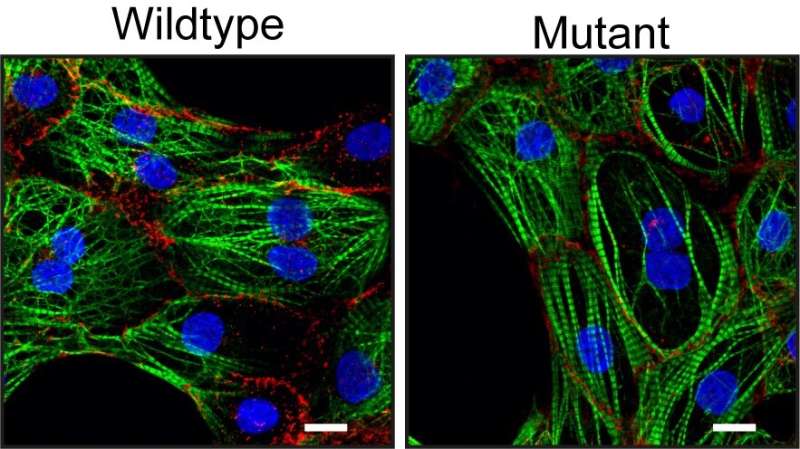This article has been reviewed according to Science X's editorial process and policies. Editors have highlighted the following attributes while ensuring the content's credibility:
fact-checked
peer-reviewed publication
trusted source
proofread
New mutation in the desmoplakin gene leads to arrhythmogenic cardiomyopathy

Researchers from the group of Eva van Rooij in collaboration with the UMC Utrecht identified a new mutation that leads to the cardiac disease arrhythmogenic cardiomyopathy (ACM).
They assessed the effect of this mutation on heart muscle cells and obtained new insights into the underlying mechanism that causes the disease. The results of this study, published in Stem Cell Reports, could contribute to the development of new treatments for ACM.
Desmosomes
Millions of heart muscle cells contract to let the heart fulfill its pumping function. To make sure these contractions are executed well, it is important that the individual heart muscle cells communicate with each other. Therefore, heart muscle cells have to be tightly connected with each other. In a healthy heart, these connections are made up of complex protein structures that form a bridge between the cells, so called desmosomes.
When mutations occur in genes that contribute to these structures, this can lead to the development of arrhythmogenic cardiomyopathy (ACM). ACM is a progressive and often hereditary disease in which the heart fails to contract properly. Even though 1 in 5,000 people develop ACM throughout life, a lot remains unknown about the disease and no effective treatment options exist to cure patients.
Discovery of a new mutation
"We investigated the genetic material of an ACM patient and encountered a previously unknown mutation in the gene desmoplakin," says first author of the study Sebastiaan van Kampen. Desmoplakin is one of the genes that is responsible for the formation of desmosomes. To investigate the role of this mutation in ACM onset, the researchers cultured heart muscle cells from the patient in the lab.
Van Kampen says, "We compared these heart muscle cells to the same heart muscle cells in which we repaired the mutation using CRISPR/Cas9. The heart muscle cells that contained the mutation turned out to be less tightly connected".
In addition, the researchers discovered that these cells have fewer of ion channels. These channels are crucial for efficient propagation of the action potential, an electrical signal that stimulates contraction, between heart muscle cells. From this, they concluded that the new mutation can lead to ACM in patients.
Underlying mechanism
Multiple mutations are known to lead to ACM. Nevertheless, the underlying mechanism that leads to the disease remains largely unknown. To change this, the researchers used the cultured heart muscle cells from the patient as a model for the disease. They discovered that a protein named PITX2 is more highly expressed in the "diseased" heart muscle cells and that this protein is in part responsible for the loss of desmosomes and ion channels.
"When we removed the protein from the diseased heart muscle cells, the levels of ion channels and desmosomal proteins in the cells of the patient showed a remarkable recovery," explains Van Kampen. The PITX2 protein thus plays an important role in the changes in the mutated heart muscle cells.
Future treatments
The study, published in Stem Cell Reports, can potentially contribute to the development of new treatments for ACM. Furthermore, the findings from this study offer new insights into the development of ACM that can be valuable for future research.
"Although we don't know how the new mutation leads to increased levels of PITX2, we see the same happening in a second mutation. It's possible that increased levels of PITX2 lead to ACM in the context of many more mutations," says Eva van Rooij, group leader at the Hubrecht Institute and last author of the study. More research into these different mutations is therefore essential.
More information: Eva van Rooij, PITX2 induction leads to impaired cardiomyocyte function in arrhythmogenic cardiomyopathy, Stem Cell Reports (2023). DOI: 10.1016/j.stemcr.2023.01.015. www.cell.com/stem-cell-reports … 2213-6711(23)00018-8





















